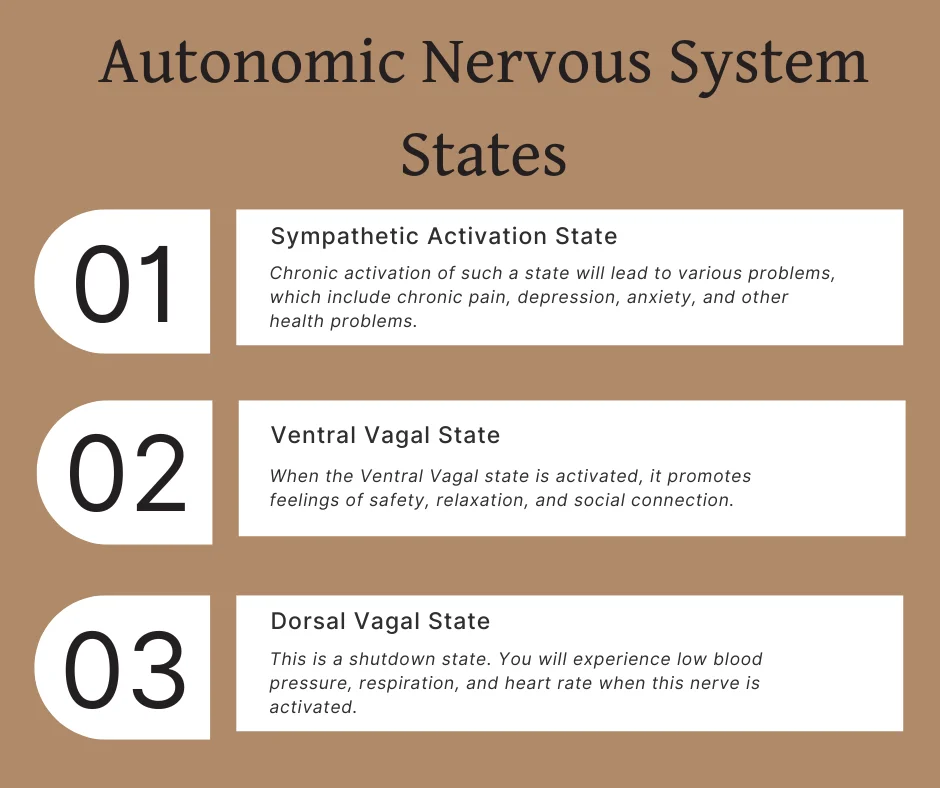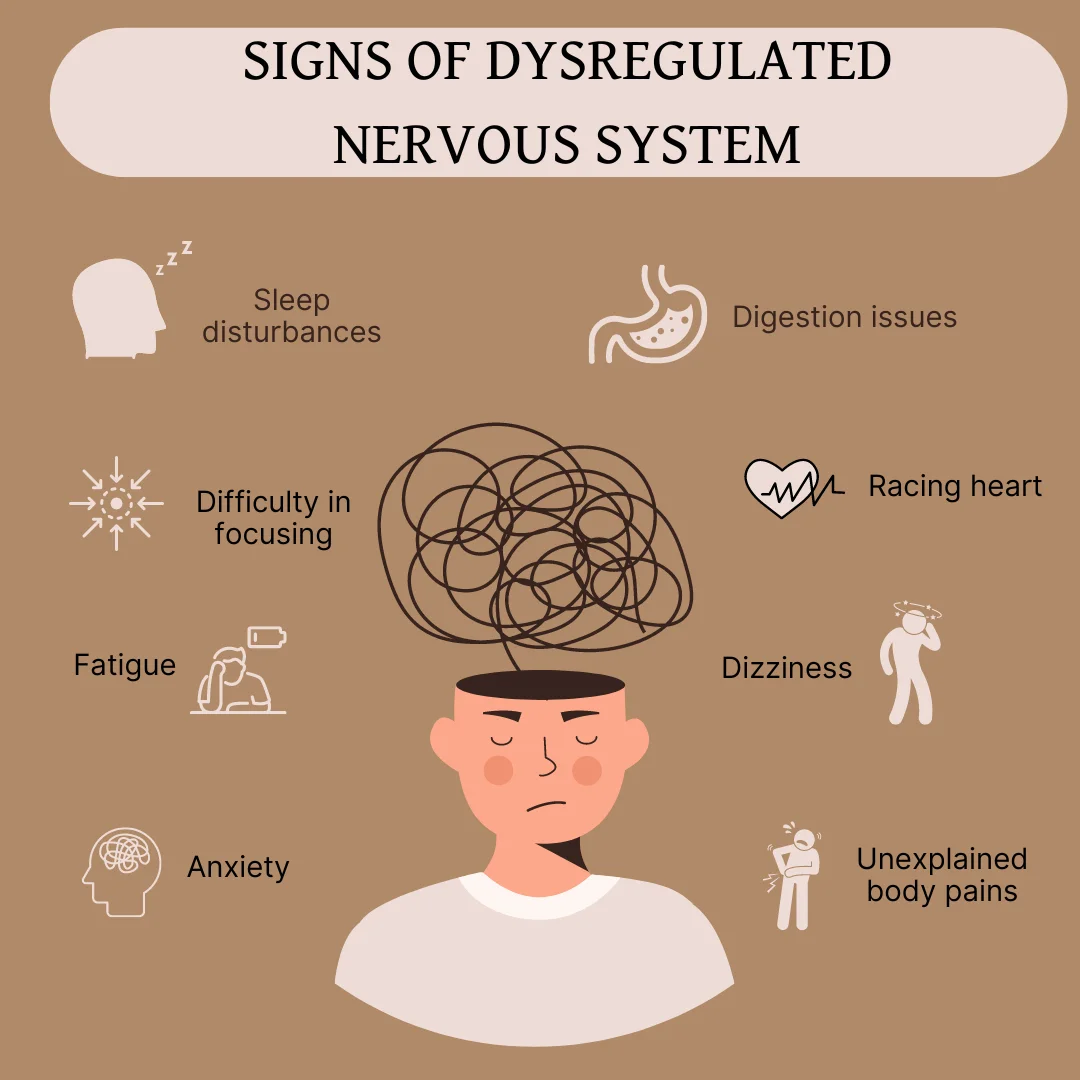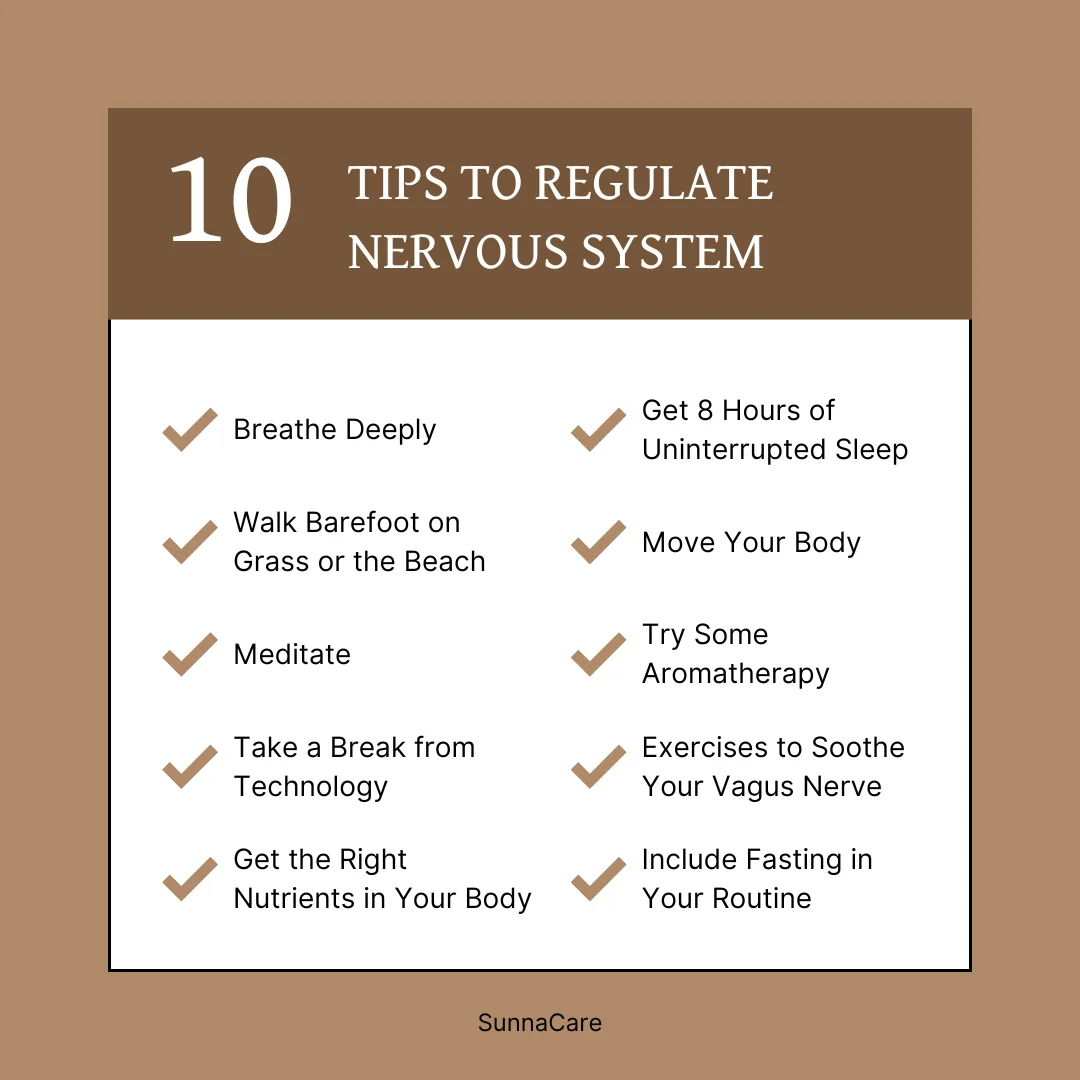How to Regulate Nervous System: A Guide for Muslims
How to Regulate Nervous System: A Guide for Muslims
How to Regulate Nervous System: A Guide for Muslims
How to Regulate Nervous System: A Guide for Muslims
Islam has always valued the importance of our emotional well-being and mental health. Our bodies are connected to our minds, so caring for our bodies and regulating our nervous systems leads to overall well-being.
Your nervous system might be dysregulated without you even knowing. If you want to take charge of your health, here is everything you need to know about how to regulate nervous system.
What Consists of Our Nervous System?
Before we learn how to regulate nervous system, it is important to understand what it is and how it works. Here are the different parts of the nervous system that you must be familiar with:
1. The Autonomic Nervous System (ANS)
The ANS has the primary responsibility of moderating our bodies’ response to internal and external stressors. There are two branches within this system: the Sympathetic Nervous System (fight or flight) and the Parasympathetic Nervous System (rest and digest).
Both of these systems control the same organs, but they work in different directions. Let’s learn about these two in detail.
2. Sympathetic Nervous System
You may have heard of the body’s fight-or-flight response, what is it really? When there are external stressors in our environment, our bodies are equipped to survive these stimuli through the fight-or-flight response.
When the fight-or-flight response activates, various hormones like adrenaline and cortisol rise, along with blood pressure, heart rate, and speed of breathing.
All these biological responses are helpful when faced with life threatening situations and are critical to either confront or escape the stress inducing stimulus. However, these responses are not helpful when you are stressed at your workplace or in typical social situations, and this response gets activated.
In such cases, your body activates the fight-or-flight response and you have excess energy but little outlet for release.
3. Parasympathetic Nervous System
This nervous system is also known as the brake pedal, and it will slow down some of the bodily responses to help you be more calm. This branch of the nervous system is responsible for helping you relax, sleep, and rest.
The parasympathetic nervous system also helps with digestion, sleep, and repairing body cells. Here are some symptoms that your parasympathetic nervous system is in motion:
- Slower and deep breathing
- Reduction in breathing
- Stimulating digestion
- Increasing digestive enzymes
- Soft eye focus
If you have problems with this system, then it will be difficult for you to activate your relaxation response and recover from stressors.
The Top Three States of Our Autonomic Nervous System

Our ANS has various states that respond to the cues of our environment. Not all of them are favourable, which may lead to the dysregulation of your nervous system.
Understanding these three states will help you understand how to regulate nervous system:
1. Sympathetic Activation State
As we established before, this is associated with the fight-or-flight response. However, chronic activation of such a state will lead to various problems, which include chronic pain, depression, anxiety, and other health problems.
2. Ventral Vagal State
When the Ventral Vagal state is activated, it promotes feelings of safety, relaxation, and social connection. It is associated with the ventral vagus nerve in the brainstem that regulates various functions of our body.
These functions include:
- Facial expression
- Digestion
- And heart rate
You will feel connected and calm and will want to engage with the world around you.
3. Dorsal Vagal State
This is a shutdown state. You will experience low blood pressure, respiration, and heart rate when this nerve is activated.
Your immune and digestive functions will also shut down. Such a state is associated with helplessness, dissociation, and disconnection.
People experiencing chronic stress or trauma are in this state.
12 Signs of a Dysregulated Nervous System

A dysregulated nervous system is one that has been thrown off balance. It means that your sympathetic and dorsal states are activated, and the parasympathetic or ventral vagal state is not activated at all or very little.
Here are some signs that you may have a dysregulated nervous system:
- Digestive problems
- Sleep disturbances
- Difficulty focusing
- Difficulty in regulating emotions
- Unexplained body pains
- Racing heart
- Dizziness
- Feeling out of control
- Headaches
- Feelings of panic or dread
- Constant fatigue
- Anxiety
If you experience a number of these symptoms, it means that your nervous system may be dysregulated. If so, you must take the necessary steps and learn how to regulate nervous system to promote healing.
Reasons for a Dysregulated Nervous System
Various stressors can impact your nervous system and cause it to be dysregulated. These include the following:
- Chronic stress
- Traumatic experiences and events in your life
- Unhealthy diet
- Not taking the time to relax
- Poor sleep hygiene
- Constant exposure to technology
- Depression or anxiety
- And much more
The first step is awareness. Once you are aware that your nervous system is dysregulated, you can take the next steps of how to regulate nervous system.
12 Best Practices on How to Regulate Nervous System Effectively

By now, you will know whether or not your nervous system is regulated. If you feel dysregulated, here are the best practices on how to regulate nervous system effectively:
1. Breathe Deeply
Deep breathing is one of the best ways to activate your parasympathetic nervous system and ensure relaxation. We recommend taking slow and deep breaths.
If this is difficult at first, you can focus on your breath to keep your focus on the task at hand. Focus on how the breath enters and leaves your body.
There are endless deep breathing resources online that will help guide you with this exercise. Be sure to incorporate it at least once daily to relax your nervous system.
2. Get 8 Hours of Uninterrupted Sleep
Deep and uninterrupted sleep is one of the most important factors for overall wellbeing. It is during sleep that your body has the chance to heal and repair itself, which is why this an important step when you learn how to regulate nervous system.
Besides that, the brain also takes advantage of this time to cleanse itself of toxins. If this is difficult for you at first, we recommend you minimize exposure to light after sunset and expose your eyes to the sun in the morning.
The key is resetting your circadian rhythm so your biological clock can work better and determine your ideal sleep cycle.
3. Walk Barefoot on Grass or the Beach
Learn how to regulate nervous system through the power of nature. You can do this by walking barefoot on the sand or grass.
When your feet touch the earth, your body will be rooted with calmness. Your nervous system will feel much more grounded.
Connecting with nature is generally calming for the mind. Studies have shown this can help with inflammation, sleep, cortisol regulation, and stress reduction.
Living in big cities and staying indoors behind screens can make this practice a bit more challenging to do on a regular basis, however, a walk in your local park might be helpful to implement this suggestion. Once you incorporate this practice in your life, you will feel much more regulated.
4. Move Your Body
One of the best ways to regulate nervous system is to incorporate moving your body into your life. This can be through exercise, yoga, jogging, dancing, Pilates, or anything else that will make movement enjoyable for you.
In the long run, this will help you release the tension in your body and it will feel more at ease. You will also be more aware of your body, and the way it functions.
Even praying five times a day will help you get into the practice of moving your body more often at different times of the day.
5. Meditate
Recently, there has been a high focus on meditation and similar wellness activities. Research has shown that meditation can help with anxiety, depression, stress, poor sleep, and more.
It will also help you gain awareness of your emotions and thoughts to deal with them in a better manner. There are various types of meditation you can choose from.
These include Zen meditation, mindfulness meditation, object meditation, and much more. You can select the one most suitable for you to improve your nervous system and mental health.
6. Try Some Aromatherapy
Our sense of smell is one of our most powerful senses, and it can trigger various memories and emotions for us. Some senses can even play on our behavior.
For example, the smell of coffee can make you more alert, and the smell of food can make you hungry. The reason for this is that our sense of smell is linked with our nervous system.
Recent studies have also shown that aromas can have a stress-reduction effect on the nervous system. You can use the power of essential oils or diffusers to reduce stress as you smell scents you like.
Do this before bedtime to promote a stress-free environment and enhance relaxation before going into a deep sleep and learn how to regulate nervous system.
7. Take a Break from Technology
Overstimulation can lead to nervous system dysregulation, which is why it is crucial to learn how to regulate nervous system by taking a break.
Laptops, smartphones, and all other gadgets keep us plugged into technology. You can also waste hours just doom scrolling without even realizing.
Sometimes, the habit becomes so strong that it is not easy to let it go. Blue light have physiological effects too, such as sleep disruption, which is why it is better to take some time in the day without using screens.
Create a schedule for yourself that includes some downtime without using any electronic devices. For example, you can take some tech-free time after waking up or before sleeping to ensure your nervous system is regulating properly throughout the day.
8. Exercises to Soothe Your Vagus Nerve
As we learned in the previous section, the vagus nerve is responsible for activating our parasympathetic nervous system. The nerve is connected to the muscles behind the throat and our vocal chords.
You can physically stimulate this nerve by laughing, singing, chanting, or even gargling. The physical sensation while doing these activities can activate your nerves.
Learn how to regulate nervous system with the power of laughing or singing. You can also recite the Quran, which will activate your vocal cords and help you soothe your vagus nerve.
9. Get the Right Nutrients in Your Body
The saying we are what we eat has some truth to it. The reason for this is that what we consume also affects our nervous system.
Even the Quran stresses right and healthy eating habits without being excessive. “Eat and drink but avoid excess” (Quran, 20:81).
For example, Omega 3 fatty acids are important for our nervous system to function properly. These acids protect our nerves from damage by insulating the nerve cells.
You can get Omega 3 through seafood, seeds, and plant oils. Other essential nutrients for nervous system regulation include the following:
- Magnesium: Helps us induce the body’s relaxation response
- B Vitamins: These help produce neurotransmitters and protect our nerve coverings
- L-Theanine: Green tea and matcha include L-theanine and can help you deal with your sleep issues while increasing dopamine, serotonin, and GABA levels
Make sure you have a healthy diet, and you are getting all the essential nutrients your body requires to function optimally.
10. Include Fasting in Your Routine
Muslims fast once a year, but do you know that it can help you with your nervous system health all year? You can implement fasting for other parts of the year outside of Ramadan.
Your body will thank you for the benefits from fasting periodically throughout the year. The biggest benefit of fasting is that abstaining from food or drinks for a certain period of time can enhance your body’s ability to heal and rest.
If you are experiencing a dysregulated nervous system, you can try fasting to improve your focus and mental clarity. It also activates your parasympathetic nervous system to help you feel calm.
Your body will be in rest and digest mode and will suppress your flight or fight responses.
11. Opt for Cupping
Cupping has existed for centuries, and it is known as Hijama in the Muslim world. Muslims have been practicing cupping therapy for a long time in accordance with the way of the Prophet (P.B.U.H).
However, recent studies have shown the scientific benefits of cupping, too. For example, cupping therapy can help improve the ability of the ANS.
Because of this, you will feel less stressed and more relaxed. It will balance your sympathetic and parasympathetic nervous system so your body can rest and relax, making it one of the top practices to incorporate when learning how to regulate nervous system.
12. Opt for Coaching
If you can’t seem to get ahold of how to regulate nervous system, you are struggling, we recommend getting help from a licensed coach. They will assess your situation and provide you with practices that will suit your specific issues.
Then, they will also keep you accountable on your journey toward healing. In the long run, this will benefit you by helping you cultivate better habits and learn how to self-soothe.
Final Thoughts
By learning how to regulate nervous system, you can begin your journey toward healing and resetting your body. Chronic stress can burnout the body and mind, which is why it is crucial to take time to relax and incorporate stress-free practices into your life.
If you are struggling, you can get in touch with our life coaches. They will assist you during this time and provide you with the practice you need to heal your nervous system in the long run.



